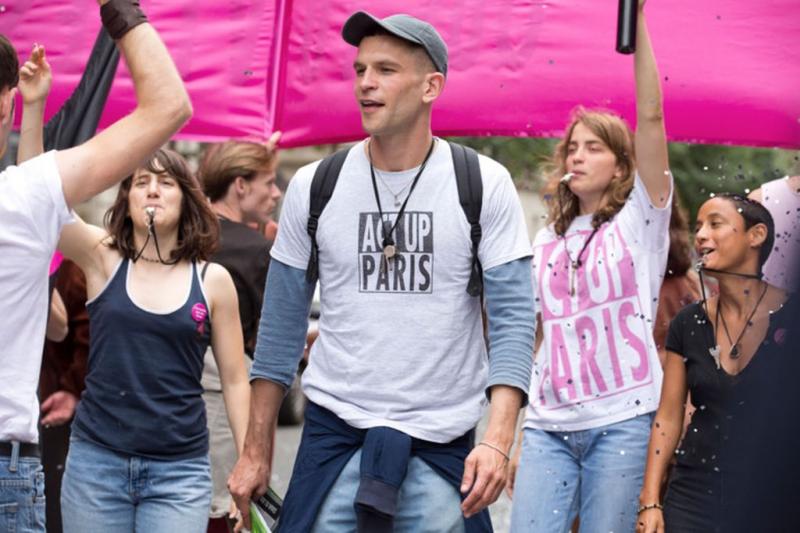120 BPM review - stirring portrait of French activism in the age of AIDS | reviews, news & interviews
120 BPM review - stirring portrait of French activism in the age of AIDS
120 BPM review - stirring portrait of French activism in the age of AIDS
Cannes prize-winner deftly mixes the personal and the political

Activism is back with a vengeance in our parlous political age, so what better time to welcome 120 BPM as a reminder of an impulse that has never truly gone away?
Folding the tensions within and around the Paris branch of the AIDS activist movement ACT UP, Campillo functions here as both the chronicler of an anxious time and as a romantic who has a love story to tell, albeit one that will come to grief. The unfolding love that develops between the lippy provocateur Sean (Nahuel Pérez Biscayart) and the comparatively indrawn and watchful Nathan (Arnaud Valois) places a sero-discordant couple against the roiling backdrop of a community in crisis. Silence is the most ominous sound of all in this movie's landscape, not least because it suggests that the life-defining "beats per minute" referenced in the title have come to an end.
Against the backdrop of drug trials and pharmaceutical pronouncements, we chart the gathering romance between the reckless, heroically outspoken Sean, who acquired the HIV virus at age 16, and the cautious, HIV-negative Nathan, who says that he has given up sex for five years. As the two men play beat the clock against Sean's illness, a larger portrait emerges of group dynamics pushed to the limit and sometimes beyond in a community (pictured above) for whom the cause is all. Intriguingly, almost none of the ACT UP participants are glimpsed in the workplace or even at home: their lives, we come to understand, exist on the frontline at a time in history when even the Seine is seen to run red with blood and Bronski Beat is the best defense against the dread that comes with silence.
As the two men play beat the clock against Sean's illness, a larger portrait emerges of group dynamics pushed to the limit and sometimes beyond in a community (pictured above) for whom the cause is all. Intriguingly, almost none of the ACT UP participants are glimpsed in the workplace or even at home: their lives, we come to understand, exist on the frontline at a time in history when even the Seine is seen to run red with blood and Bronski Beat is the best defense against the dread that comes with silence.
The movie celebrates its characters' bravado without ever sentimentalising it, and one is keenly aware of the way in which individual responses to the ravages of AIDS threaten to divide an agitated assemblage who don't necessarily speak with one voice. Group leader Thibault (Antoine Reinartz) must reconcile divergent points of view, while others in his ranks seek to up the level of protest-driven mayhem leaving still others to argue for the primacy first and foremost of fun. If such a thing is even still possible.
At 140 minutes, the film feels its length, and Nathan himself remains almost too idealised a figure, notwithstanding the compelling gentleness that Valois brings to the role. A kind of Gallic equivalent of Tony Kushner's Prior Walter, the Franco-Chilean Sean, in turn, is the showiest, most searing part, and the Argentine-born Biscayart finds the complex, self-contradictory facets in an ailing livewire who has to struggle to get beyond his anger (and his smoking). The belated introduction of his mother feels like too little too late, and one yearns sometimes for a broader canvas than Campillo has very deliberately allowed. These are minor cavils, though, given how honestly 120 BPM comes by its title: it sets the pulse racing in what emerges as an adrenaline rush of a requiem.
The future of Arts Journalism
You can stop theartsdesk.com closing!
We urgently need financing to survive. Our fundraising drive has thus far raised £49,000 but we need to reach £100,000 or we will be forced to close. Please contribute here: https://gofund.me/c3f6033d
And if you can forward this information to anyone who might assist, we’d be grateful.

Subscribe to theartsdesk.com
Thank you for continuing to read our work on theartsdesk.com. For unlimited access to every article in its entirety, including our archive of more than 15,000 pieces, we're asking for £5 per month or £40 per year. We feel it's a very good deal, and hope you do too.
To take a subscription now simply click here.
And if you're looking for that extra gift for a friend or family member, why not treat them to a theartsdesk.com gift subscription?
more Film
 The Perfect Neighbor, Netflix review - Florida found-footage documentary is a harrowing watch
Sundance winner chronicles a death that should have been prevented
The Perfect Neighbor, Netflix review - Florida found-footage documentary is a harrowing watch
Sundance winner chronicles a death that should have been prevented
 Blu-ray: Le Quai des Brumes
Love twinkles in the gloom of Marcel Carné’s fogbound French poetic realist classic
Blu-ray: Le Quai des Brumes
Love twinkles in the gloom of Marcel Carné’s fogbound French poetic realist classic
 Frankenstein review - the Prometheus of the charnel house
Guillermo del Toro is fitfully inspired, but often lost in long-held ambitions
Frankenstein review - the Prometheus of the charnel house
Guillermo del Toro is fitfully inspired, but often lost in long-held ambitions
 London Film Festival 2025 - a Korean masterclass in black comedy and a Camus classic effectively realised
New films from Park Chan-wook, Gianfranco Rosi, François Ozon, Ildikó Enyedi and more
London Film Festival 2025 - a Korean masterclass in black comedy and a Camus classic effectively realised
New films from Park Chan-wook, Gianfranco Rosi, François Ozon, Ildikó Enyedi and more
 After the Hunt review - muddled #MeToo provocation
Julia Roberts excels despite misfiring drama
After the Hunt review - muddled #MeToo provocation
Julia Roberts excels despite misfiring drama
 Ballad of a Small Player review - Colin Farrell's all in as a gambler down on his luck
Conclave director Edward Berger swaps the Vatican for Asia's sin city
Ballad of a Small Player review - Colin Farrell's all in as a gambler down on his luck
Conclave director Edward Berger swaps the Vatican for Asia's sin city
 London Film Festival 2025 - Bradley Cooper channels John Bishop, the Boss goes to Nebraska, and a French pandemic
... not to mention Kristen Stewart's directing debut and a punchy prison drama
London Film Festival 2025 - Bradley Cooper channels John Bishop, the Boss goes to Nebraska, and a French pandemic
... not to mention Kristen Stewart's directing debut and a punchy prison drama
 London Film Festival 2025 - from paranoia in Brazil and Iran, to light relief in New York and Tuscany
'Jay Kelly' disappoints, 'It Was Just an Accident' doesn't
London Film Festival 2025 - from paranoia in Brazil and Iran, to light relief in New York and Tuscany
'Jay Kelly' disappoints, 'It Was Just an Accident' doesn't
 Iron Ladies review - working-class heroines of the Miners' Strike
Documentary salutes the staunch women who fought Thatcher's pit closures
Iron Ladies review - working-class heroines of the Miners' Strike
Documentary salutes the staunch women who fought Thatcher's pit closures
 Blu-ray: The Man in the White Suit
Ealing Studios' prescient black comedy, as sharp as ever
Blu-ray: The Man in the White Suit
Ealing Studios' prescient black comedy, as sharp as ever
 The Woman in Cabin 10 review - Scandi noir meets Agatha Christie on a superyacht
Reason goes overboard on a seagoing mystery thriller
The Woman in Cabin 10 review - Scandi noir meets Agatha Christie on a superyacht
Reason goes overboard on a seagoing mystery thriller
 London Film Festival 2025 - crime, punishment, pop stars and shrinks
Daniel Craig investigates, Jodie Foster speaks French and Colin Farrell has a gambling habit
London Film Festival 2025 - crime, punishment, pop stars and shrinks
Daniel Craig investigates, Jodie Foster speaks French and Colin Farrell has a gambling habit

Add comment